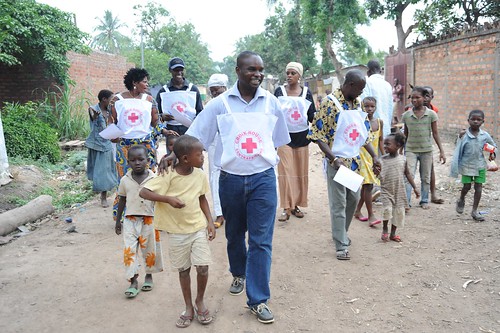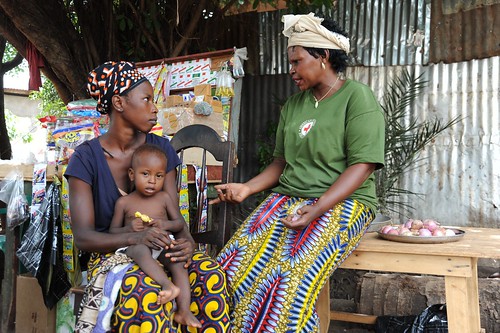Ed note: Special to UN Dispatch. Abi Weaver, senior communications officer with the American Red Cross, talks about her recent visit to the Central African Republic and how vaccines reach their potential.

Volunteers with the Central African Red Cross Society walk the streets of Ramadji, promoting an upcoming integrated vaccination campaign. Credit: Daniel Cima
“Vaccines don’t actually reach their potential until they meet the communities that need them, protecting children from the invisible monsters that will try to derail their futures. The Red Cross forms that critical link.”
I typed this into my BlackBerry the first night I arrived in the Central African Republic. Looking back, I am not sure if it was a reminder or an observation, but it surely presented itself as a theme during my visit to the conflict-stricken country ahead of its mass measles vaccination campaign last month.
As the world’s largest humanitarian organization with a presence in virtually every corner of the world, the Red Cross contributes its most valuable resource –- community-based volunteers –- to make sure the power of vaccines is realized.
The success of any immunization campaign depends largely on two things: delivering the vaccine and spreading the word.
Leading up to this particular campaign, I witnessed Red Cross volunteers using a variety of techniques, including mass media, rallies, door-to-door visits and entertainment, to reach internally-displaced populations, distant villages and families usually missed by routine health services. Songs were written, theatrical plays conducted and fliers passed out at schools to inform parents of when and where their child could receive a vaccination.

Regina, a mother of eight, talks with other mothers about the benefits of bringing their children in to be vaccinated. Credit: Daniel Cima
At the same time, our Measles Initiative partners and local health workers were devising plans to bring the vaccine to these same places. In the week that followed, hundreds of thousands of children were immunized against some of the world’s greatest health threats –- measles and polio. Vitamin A and deworming medicines were also given to young children, and pregnant mothers were protected against tetanus.
Governments and the Measles Initiative credit volunteers like Regina with the vaccination of more than 900 million children across 60 countries in less than a decade. Mothers feel safe bringing their children to the vaccination posts because they know and trust the advice of Red Cross volunteers, who live in the same communities they serve. This personal outreach has increased participation in campaigns by as much as 10 percent, leading to greater immunization coverage and warding off outbreaks.

Red Cross volunteer Anton went to great lengths to give a group of orphans their best shot at a healthy life. Credit: Marko Kokic
For years, I have told the story of Anton Chilufya, turning him into somewhat of a poster-child for social mobilization success. (The amazing photo doesn’t hurt.) A Red Cross volunteer from Zambia, Anton noticed when a group of orphans from his village had not shown up to receive their vaccinations and rode his bicycle five miles to personally collect them, ensuring that no child went without the opportunity to be immunized.
He is Living Proof that foreign assistance paired with local knowledge is making a positive impact.
His work represents the power of what a community-based organization can do when it is supported by a global network. The Red Cross has the scale, scope, knowledge and trust to bring people and vaccines together – sometimes with nothing more than a bicycle.
When you sign a petition or make a donation, you are also becoming a critical link in this lifesaving global effort. You can help vaccines reach their potential through simple actions that have been proven to have a powerful impact.
